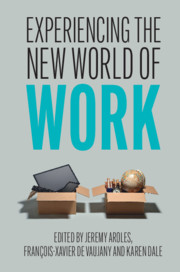Book contents
- Experiencing the New World of Work
- Experiencing the New World of Work
- Copyright page
- Contents
- Tables
- Contributors
- Foreword
- Introduction
- Part I Experiencing at Work
- Part II Digital Platforms and the New World of Work
- Part III Politics, Imaginaries and Others in the New World of Work
- Conclusion
- Afterword
- Index
- References
Conclusion
Experiences of Continuity and Change in the New World of Work
Published online by Cambridge University Press: 24 December 2020
- Experiencing the New World of Work
- Experiencing the New World of Work
- Copyright page
- Contents
- Tables
- Contributors
- Foreword
- Introduction
- Part I Experiencing at Work
- Part II Digital Platforms and the New World of Work
- Part III Politics, Imaginaries and Others in the New World of Work
- Conclusion
- Afterword
- Index
- References
Summary
This edited volume has endeavoured to link micro-social experiences of work with the wider macro-social context in which these changes operate, so as to provide a rich and detailed account of the most prominent manifestations of the ‘new’ world of work. As they delved into the minutiae of the new world of work, the chapters of this edited volume have explored some of the continuities and discontinuities in ways of working, as a means of fleshing out the socio-economic context of the micro-social experiences of work. In particular, three aspects of these changes and continuities have recurrently emerged throughout the chapters. These are: (i) creativity and changing skills; (ii) the time and space of work; and (iii) the changing nature of the employment relationship and beyond. In this concluding chapter, we reflect further on these themes.
- Type
- Chapter
- Information
- Experiencing the New World of Work , pp. 253 - 263Publisher: Cambridge University PressPrint publication year: 2021

